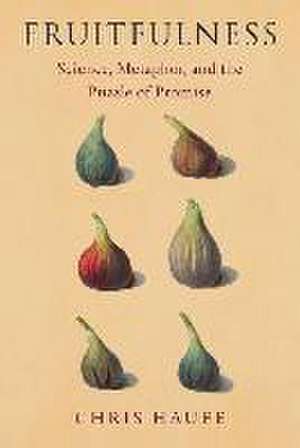Fruitfulness: Science, Metaphor, and the Puzzle of Promise: Oxford Studies in Philosophy of Science
Autor Chris Haufeen Limba Engleză Hardback – 29 aug 2024
Din seria Oxford Studies in Philosophy of Science
- 23%
 Preț: 454.29 lei
Preț: 454.29 lei - 12%
 Preț: 562.41 lei
Preț: 562.41 lei - 10%
 Preț: 439.51 lei
Preț: 439.51 lei - 12%
 Preț: 562.25 lei
Preț: 562.25 lei - 21%
 Preț: 139.38 lei
Preț: 139.38 lei - 8%
 Preț: 292.88 lei
Preț: 292.88 lei -
 Preț: 322.72 lei
Preț: 322.72 lei - 28%
 Preț: 493.12 lei
Preț: 493.12 lei - 30%
 Preț: 486.23 lei
Preț: 486.23 lei -
 Preț: 240.79 lei
Preț: 240.79 lei - 22%
 Preț: 331.61 lei
Preț: 331.61 lei - 12%
 Preț: 334.69 lei
Preț: 334.69 lei - 12%
 Preț: 293.35 lei
Preț: 293.35 lei - 30%
 Preț: 549.62 lei
Preț: 549.62 lei - 12%
 Preț: 304.56 lei
Preț: 304.56 lei - 26%
 Preț: 521.17 lei
Preț: 521.17 lei - 7%
 Preț: 214.35 lei
Preț: 214.35 lei - 12%
 Preț: 217.68 lei
Preț: 217.68 lei - 14%
 Preț: 288.12 lei
Preț: 288.12 lei - 24%
 Preț: 453.45 lei
Preț: 453.45 lei - 25%
 Preț: 534.94 lei
Preț: 534.94 lei - 15%
 Preț: 250.72 lei
Preț: 250.72 lei - 25%
 Preț: 532.78 lei
Preț: 532.78 lei - 26%
 Preț: 587.94 lei
Preț: 587.94 lei
Preț: 155.40 lei
Preț vechi: 199.72 lei
-22% Nou
Puncte Express: 233
Preț estimativ în valută:
29.74€ • 32.29$ • 24.98£
29.74€ • 32.29$ • 24.98£
Carte disponibilă
Livrare economică 21-27 martie
Preluare comenzi: 021 569.72.76
Specificații
ISBN-13: 9780197666395
ISBN-10: 0197666396
Pagini: 320
Dimensiuni: 135 x 198 x 28 mm
Greutate: 0.45 kg
Editura: Oxford University Press
Colecția OUP USA
Seria Oxford Studies in Philosophy of Science
Locul publicării:New York, United States
ISBN-10: 0197666396
Pagini: 320
Dimensiuni: 135 x 198 x 28 mm
Greutate: 0.45 kg
Editura: Oxford University Press
Colecția OUP USA
Seria Oxford Studies in Philosophy of Science
Locul publicării:New York, United States
Recenzii
"Chris Haufe has written a very important book about potential fertility, one of the most significant virtues that a scientific theory can possess. A new theory can merit serious attention, despite having severe problems and few accomplishments, because it shows great promise. But how can its promise reasonably be judged? Drawing on a wealth of historical case-studies, Haufe explains how a new theory can provide open-ended tools and apt metaphors for generating solvable problems. Written in a delightfully wry, irreverent style, Haufe's book will prove enormously fruitful."
"Haufe makes a powerful and provocative case that we ought to think of scientific progress at least as much in terms of a dynamic quality of our attempts to model the world-fruitfulness-as in terms of static criteria such as truth or empirical success."
"Most scientists have far more ideas for research projects than time or resources. How do we decide which research avenues to pursue? And why do some solutions to questions arrive full of resolution to other questions? In responding to three challenges posed by Thomas Kuhn to the rationality of science, Chris Haufe develops the idea of fruitfulness as a motivating concern, for scientists pursuing fecund and solvable problems and for the special epistemic status of science as an enterprise. This novel and insightful contribution warrants study by philosophers and scientists alike."
"Haufe makes a powerful and provocative case that we ought to think of scientific progress at least as much in terms of a dynamic quality of our attempts to model the world-fruitfulness-as in terms of static criteria such as truth or empirical success."
"Most scientists have far more ideas for research projects than time or resources. How do we decide which research avenues to pursue? And why do some solutions to questions arrive full of resolution to other questions? In responding to three challenges posed by Thomas Kuhn to the rationality of science, Chris Haufe develops the idea of fruitfulness as a motivating concern, for scientists pursuing fecund and solvable problems and for the special epistemic status of science as an enterprise. This novel and insightful contribution warrants study by philosophers and scientists alike."
Notă biografică
Chris Haufe is the Elizabeth M. and William C. Treuhaft Professor of the Humanities at Case Western Reserve University. He works on problems in the history and philosophy of knowledge.
